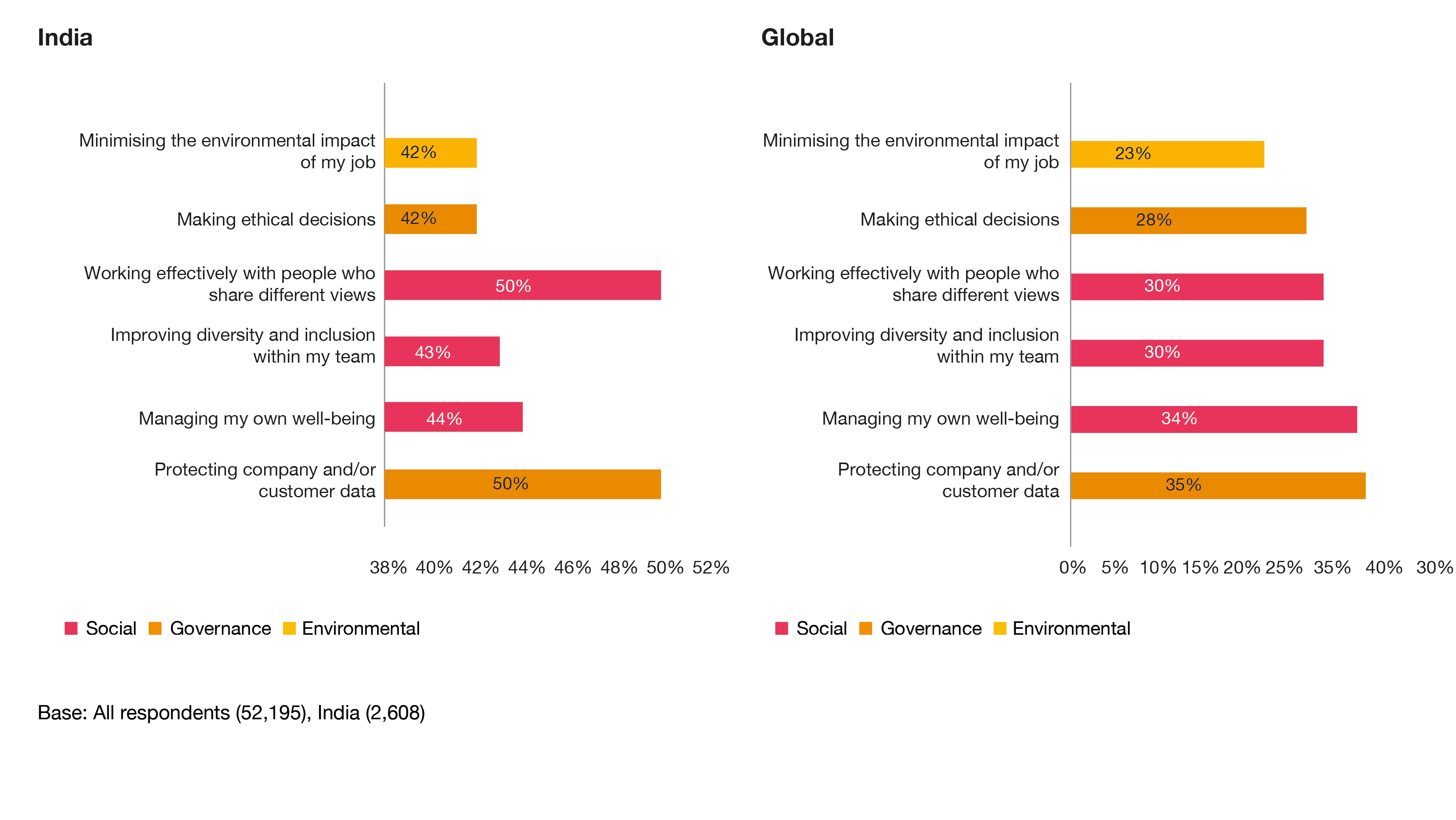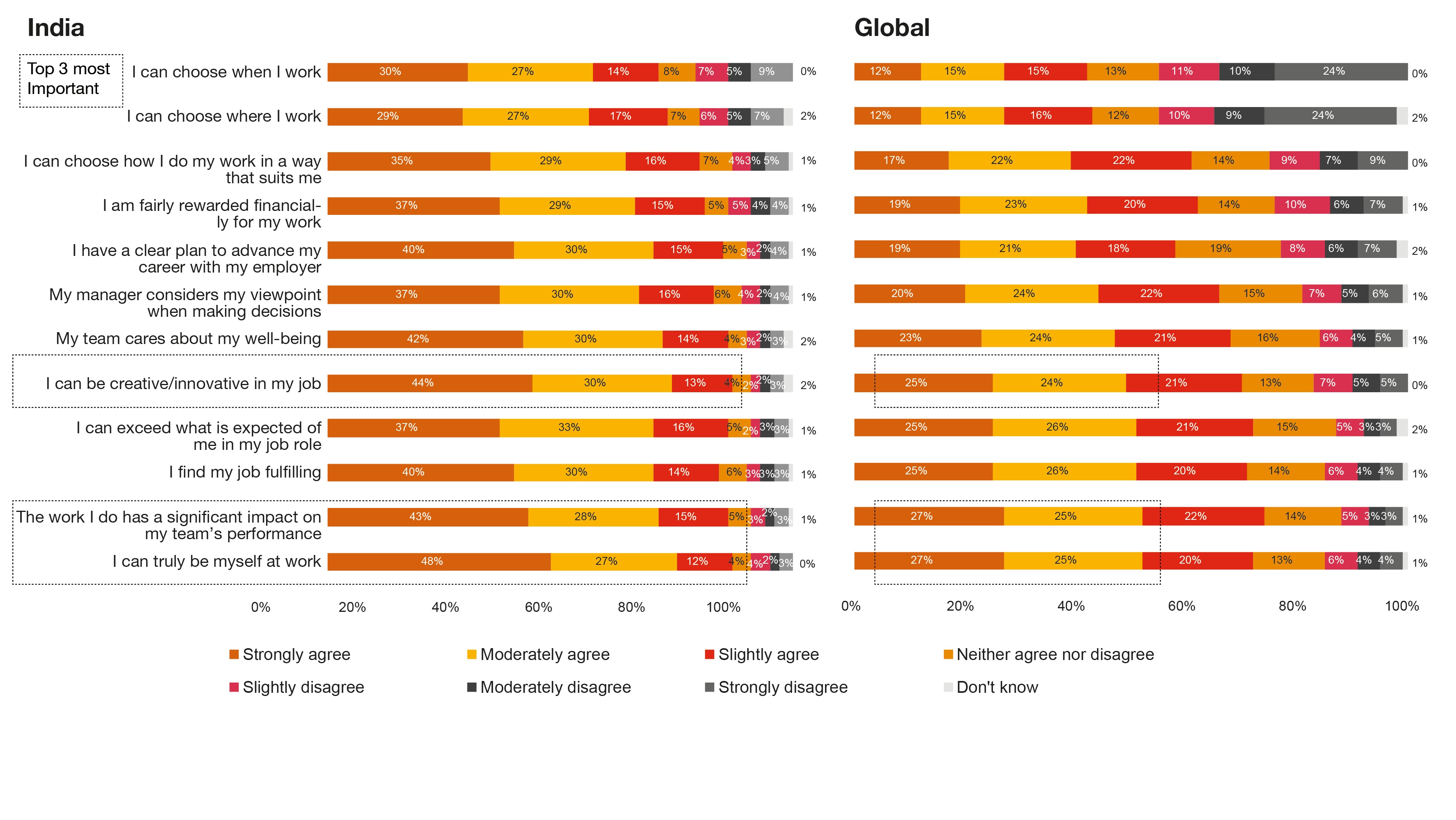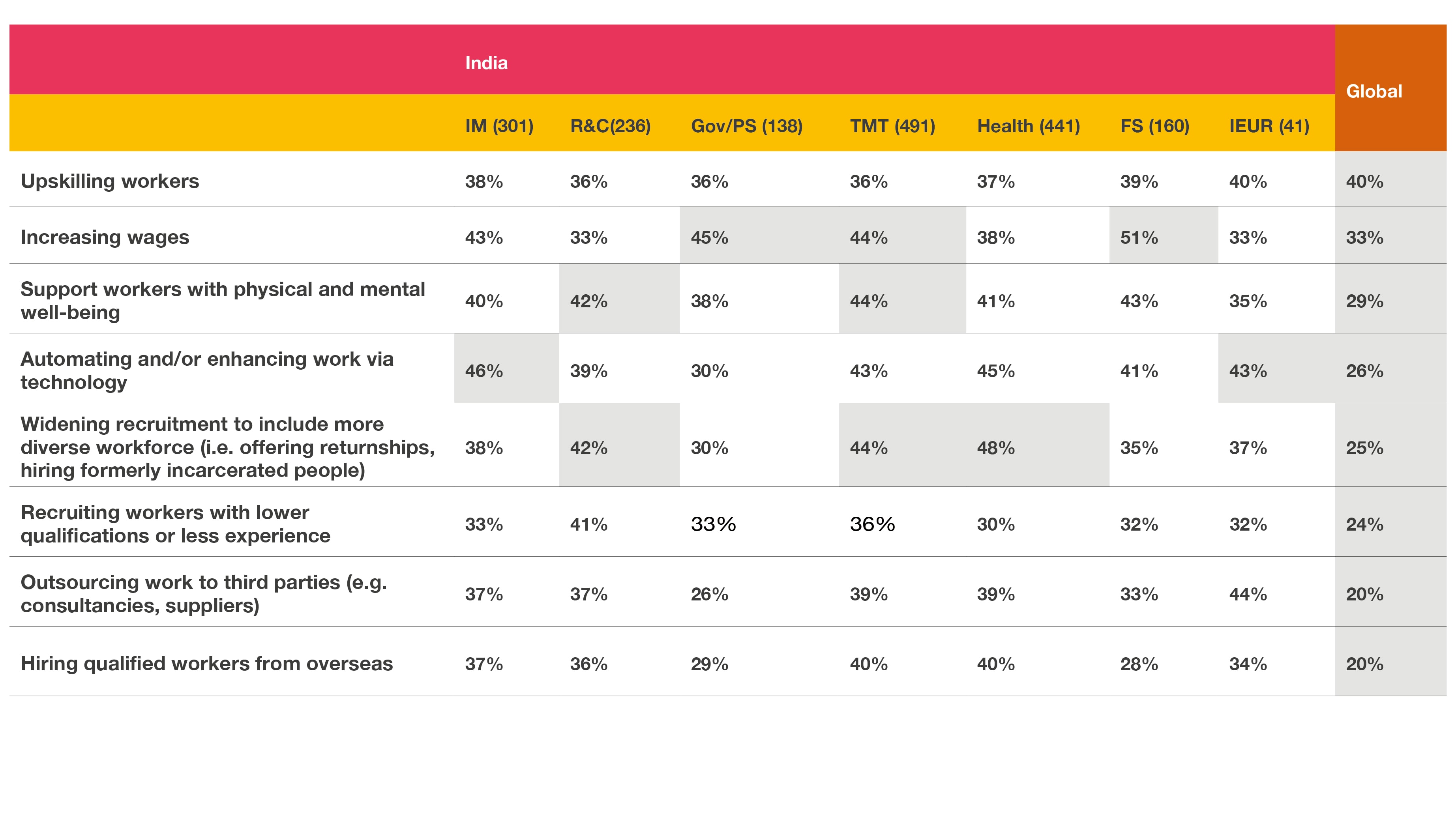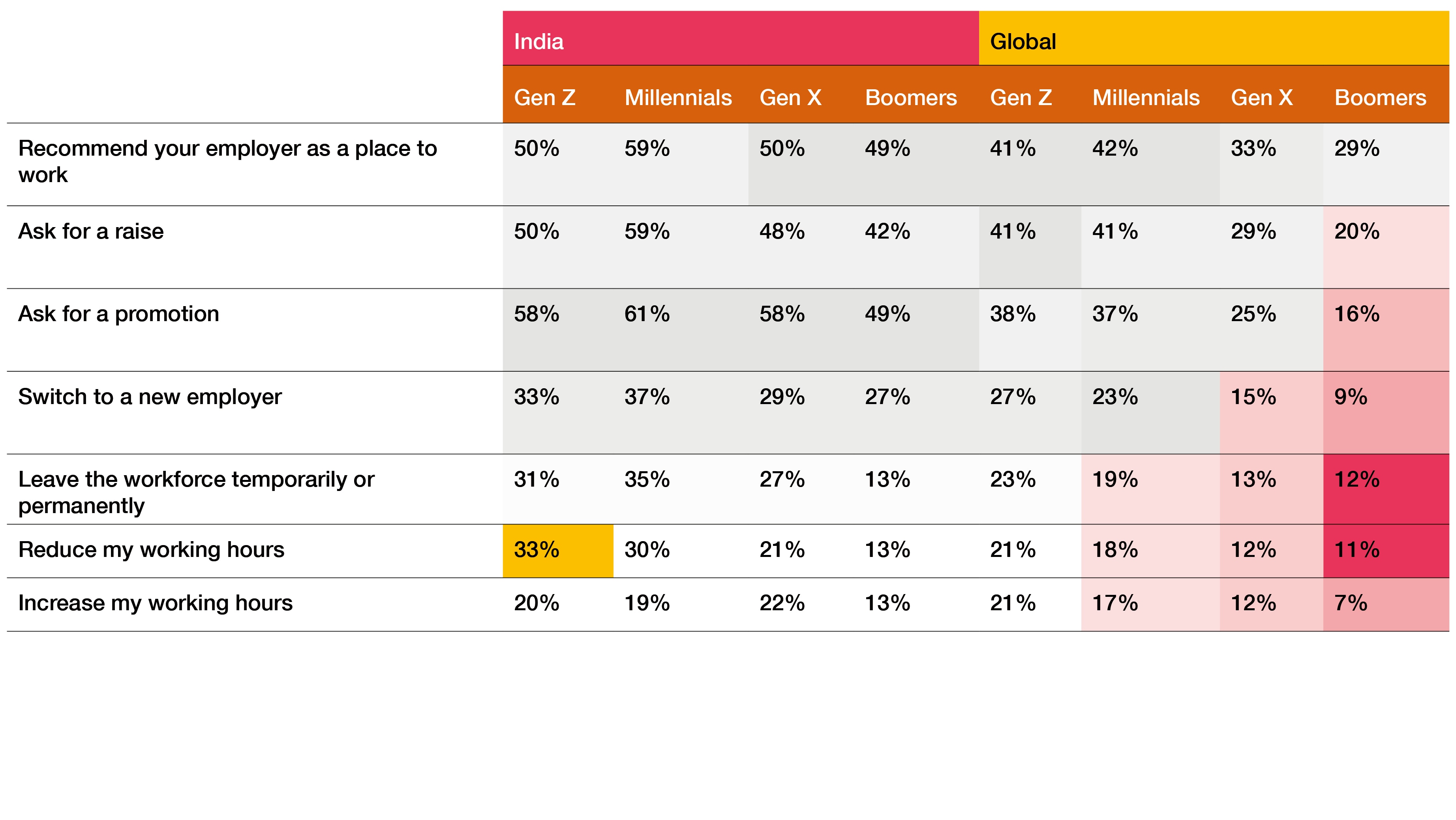The past couple of years have brought about a significant change in the workplace with the changing dynamics between the employee and employer. There has been a shift in mindset on both sides of the table. Employers are more focused on building a resilient workforce strategy that balances alignment to act with speed and adaptability to position for scale. Employees, on their part, place a premium on organisational trust, innovation and hybrid ways of working. For them, financial reward and personal fulfilment are priorities when they consider making a change in their work environment. It is therefore important to factor in these shifts as employers attempt to understand what drives employee experience in the current context of a persisting wave of resignations and use these insights to recalibrate their workforce strategy.
The India Workforce Hopes and Fears Survey 2022 report underlines the principal themes in the workforce sentiment through the lived experiences of employees. The report is based on the findings of PwC’s Global Workforce Hopes and Fears Survey 2022.
The emerging themes throw light on how organisational strategy is experienced at the grass-roots level and can help define tangible measures to bring about greater alignment between organisational and individual perspectives.
Broaden the understanding of employee drivers for a data- and scenario-based workforce strategy
In our past research, leaders voiced the need to anticipate and devise plans for the future using a scenario-based approach to enterprise planning.
The Global Workforce Hopes and Fears Survey 2022 sheds light on the current and future working behaviours of employees, thus providing employers with the following specific scenarios that they need to anticipate and plan for.
The findings revealed that compensation alone will not be sufficient to attract and retain talent. The opportunity for creativity and innovation on the job and being one’s true self at work are as important as financial reward. This reinforces the need for employers to craft organisational purpose as a driver of the employee value proposition.
How important are the following factors to you when considering making a change in your work environment?
Source: PwC’s Global Workforce Hopes and Fears Survey 2022
Takeaway: A broader understanding of employee drivers is critical to integrate scenario-based planning into the talent strategy and help organisations align their workforce with their overall vision and purpose.
Build trust by embracing debate and dissent
Employers need to signal openness to discussions on social and political issues at the workplace
In today’s increasingly polarised world, the workplace has emerged as a place where sensitive political and social discussions are taking place. Blending of the personal and professional spheres makes it increasingly important for employers to acknowledge this shift. The survey reveals that 75% of employees have had conversations with their colleagues about social or political issues (frequently or sometimes).
Among employees who had never had social/political conversations, 32% said their organisations discourage such conversations as compared to 12% globally.
Data protection and support in working effectively are the two main areas where employers have provided support. They are less likely to provide support on environmental impact and making ethical decisions.
Has your employer provided support and resources to help you with any of the following?

Almost three-fourths (75%) of employees have had conversations with colleagues about
social or political issues (frequently or sometimes).

Base: All respondents (Global- 52,195, India - 2,608)
All respondents who stated ‘never’ in the question in right (Global - 6,536, India - 144)
Source: PwC’s Global Workforce Hopes and Fears Survey 2022
Takeaway: It is important for leaders to empathise and simultaneously embrace debate and dissent to build a culture of trust.
Drive empowerment with equity
Organisations are recognising that higher productivity requires the space for creativity, flexibility and being one’s true self at work
Nearly 75% of employees surveyed say they can be themselves at work, and 71% say the work they do has a significant impact on their team’s performance. Moreover, 74% of employees in India say they can be creative and/or innovative in their jobs.
To what extent do you agree or disagee with the following statements about your current work environment?

Base: All respondents (Global - 52,195, India - 2,608) Top 3 most Important
Source: PwC’s Global Workforce Hopes and Fears Survey 2022
Takeaway: Leaders need to enhance empowerment with equity by ensuring that different segments of the workforce have equal access to information, guidelines and resources to empower themselves.
A comprehensive upskilling strategy is needed to address the twin needs of specialisation and overcoming scarcity
Employers in India are addressing talent shortages through wage increases and automation, with less focus on proactive upskilling
Our insights reveal that employers are addressing skill and labour shortages through wage increases and automation, with fewer using upskilling, recruitment or outsourcing to manage shortages. Organisations clearly need to invest strategically and holistically in upskilling to proactively plan for capability shifts.
We find differences across industry segments in their strategies to address skill and labour shortages. There is a greater focus on automation in the industrial manufacturing (IM) sector, while the retail and consumer goods (R&C), technology, communications, and entertainment and media (TMT) sectors are seen to use a mix of well-being and recruitment as well as wage increases as ways to address talent shortages. Wage increases form the predominant strategy in the government/public services and financial services sectors (Gov/PS), while the healthcare sector is focusing primarily on recruitment.
Almost 54% of the respondents agree India lacks their skillset, while 67% of the
respondents agree that their job requires specialist training.*
Regarding your current job role, how accurate are the following statements?

*Employees in the health (healthcare, pharma, life sciences) and TMT (tech, comms, entertainment and media) sectors have the highest levels of agreement with the statements that their job requires specialist training (health: 58% [global],79% [India]; TMT: 56% [global], 71% [India]), and that their country lacks people with the skills to do their work (TMT: 36% [global), 55% [India]; health: 35% [global], 73% [India]).
Source: PwC’s Global Workforce Hopes and Fears Survey 2022
IM employers are seen to be addressing skills/labour shortages through automation, R&C through well-being and recruitment, Gov/PS through increasing wages, TMT through increasing wages, well-being and recruitment, health through recruitment and FS through increasing wages.
What, if anything, is your employer doing to address shortages in skills/labour?

Takeaway: Employers in India need to critically assess skill gaps from both the organisational and individual perspectives, move beyond short-term measures such as wage increases, and plan for a proactive and long-term upskilling strategy for future-readiness.
Leverage technology to augment human potential
Despite employer commitment to investing in technology, employees are not experiencing it either as an enabler or as an opportunity
More than half of the respondents (a significantly higher number compared to their global peers) are concerned about the lack of opportunities to work with or learn technological skills from colleagues, and an equal number of them also voiced concerns about not being able to receive training on digital skills from their organisation.
When you think about technology’s impact on your job over the next three years, what are you most concerned about? (rank 1–3)

Takeaway: It is critical for leaders to first adopt a technology and digital mindset, and clearly articulate the benefits that it presents for employees in terms of the opportunity of an enhanced experience and an even greater opportunity for learning and productivity.
51% of the employees in India stated that their employer is not imparting relevant technical or digital skills training needed for their career as compared to 39% globally.
When you think about technology’s impact on your job over the next three years, what are you most concerned about? (rank 1–3)

Source: PwC’s Global Workforce Hopes and Fears Survey 2022
Think creatively about employee outcomes within organisational constraints
Building the ability to rapidly access and deploy talent is emerging as one of the key differentiators for organisations across industry segments. Driving a dynamic workforce strategy requires leaders to demonstrate a sound understanding of the outcomes that employees are seeking.
More employees in India are likely to ask for a raise or promotion in the next 12 months, with millennials expressing the highest inclination to do so
In India, a far greater proportion of respondents aspire for a promotion in the coming year — 59% respondents from India say they are extremely/very likely to ask for a promotion in the next 12 months as compared to 30% globally.
Similarly, a higher percentage of respondents say they plan to ask for a raise — 53% respondents from India say they are extremely/very likely to ask for a raise in the next 12 months as compared to 35% globally.
How likely are you to take the following actions with your employer within the next 12 months? (showing only ‘extremely likely’ and ‘very likely’ responses)
Gen Z, Gen X and millenials are more likely to ask for a raise or promotion within the next 12 months, compared to boomers.
How likely are you to take the following actions with your employer within the next 12 months? (showing only ‘extremely likely’ and ‘very likely’ responses)

Source: PwC’s Global Workforce Hopes and Fears Survey 2022
Takeaway: It is imperative for organisations to think creatively about career paths that provide new advancement opportunities for employees within organisational constraints.
Call to action
Factor in employee drivers – flexibility, financial reward, fulfilment and enhanced career graph - to integrate scenario-based planning into the talent strategy.
Demonstrate employee empathy and open-mindedness to embrace debate and dissent to build a culture of trust.
Empower the workforce across the board and upskill them for future readiness.
Adopt a technology and digital mindset to create an enhanced employee experience.
Focus on career advancement plans ensuring alignment with their skill sets.
Methodology
The India Workforce Hopes and Fears Survey 2022 report is based on the findings of PwC’s Global Workforce Hopes and Fears Survey 2022. The survey included 2,608 participants from India, and 93% of them were full-time employees. Of the total number of employees surveyed, 78% were men, 16% were women and 5% were others, while 1% did not answer the question on gender. Further, 85% were employed in professional or administrative jobs, 10% did skilled manual work, and the remaining 5% did semi-skilled or unskilled manual work. The survey covered people across generations. In terms of the generational breakup, 54% of those surveyed were millennials (26–41 years), 26% were Gen X (42–57 years), 15% were Gen Z (18–25 years of age) and 5% were baby boomers (58–76 years).
Mamata to consider the below pointers:
81% of employees in India believe that their jobs can be done remotely.
31% of those who can work remotely are already working in a hybrid way
71% Indian employees are concerned about being overlooked for career.
75% employees have had sensitive social and political conversations in workplace.
59% of Indian employees (compared to 30% globally) are likely to ask for a promotion and 53% for a raise in the next 12 months.
50% of Indian employees (as against 30% of global employees) feel that their employer provides them with support to work effectively with people who share different views.
60% of women employees in India (as against 30% of women globally) state that they receive support to work effectively with people who share different views.
54% of employees strongly/moderately agree that India faces a shortage of their skill sets and 67% believing that their job requires specialist training.
More than 50% of CEOs perceive a lack of opportunities for learning technological skills.
34% of respondents in India are extremely/very likely to switch to a new employer (compared to 19% globally).
Further, 32% say they plan to leave the workforce.
Contact us














